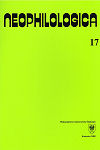La vision de l'espace dans les syntagmes locatifs kazakhs et français. Comparaison et revue des positions théoriques
How is space conceived in French and Kazakh locative adverbials?
Author(s): Mikołaj NkolloSubject(s): Language and Literature Studies
Published by: Wydawnictwo Uniwersytetu Śląskiego
Keywords: grammaticalization; case; local adverbials; time; space; abstract vs. concrete contrast; part – whole relation
Summary/Abstract: The present paper is devoted to how spatial relations are expressed in Kazakh and French locative adverbials. Kazakh, with its wide variety of inflectional endings, most frequently resorts to a special "locative" case. However, this form turns out insufficient when more detailed information is needed. Speakers are, then, bound to express relative orientation in space via series of postpositions that emerge from free lexical forms of nominal origin. Before undergoing grammaticalization these postpositions designate mainly body parts or other concrete objects. The same strategy is used when dealing with time. It has been remarked by numerous scholars that in their historical development grammatical forms develop from lexical forms and abstract relations are named with words having concrete reference. Although typologically distant, French uses relator nouns to specify localization in time and space. It is claimed that such an evolution is fully regular and not language specific.
Journal: Neophilologica
- Issue Year: 2005
- Issue No: 17
- Page Range: 187-201
- Page Count: 15
- Language: French

